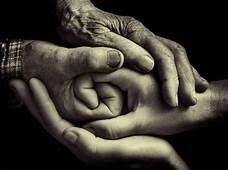Now the Beatitudes take a turn. Who are the merciful? They would seem to have some power. Some agency. Some choice.
What is mercy anyway? John Stott says, ‘Mercy is compassion for people in need.’ Another scholar substituted the word kind in lieu of merciful. The Message’s contemporary wording of the Gospel reframes this Beatitude as ‘You’re blessed when you care. At the moment of being ‘care-full,’ you find yourselves cared for.’
The Barnes commentary says those who receive this Beatitude are, ‘those who are so affected by the sufferings of others as to be disposed to alleviate them.’ Jacques Philippe expands these ideas. He writes, ‘The fifth Beatitude concerns all aspects of mercy, of course, not just forgiveness. It applies to those forms of the goodness, love, benevolence, patience and mutual support to which the New Testament so often summons us.’
Are we self-less in our mercy and caring? It’s okay to feel good about caring. As humans, we’re less likely to act solely for idealistic purposes. It helps when we’re rewarded by feeling good about what we’re doing.
That experience of satisfaction — of gaining a sense of purpose — plants the seed to continue in such a direction. Martha Stortz explains it this way, ‘So often love begins in narcissism: the heart turns in on itself. But over time grace straightens your tightly coiled affection so that it reaches beyond the self to another and then through the other to God, the source and spirit of all loving.’
Of course, it is also essential, over time, for our small acts of mercy to be separated from any expectation of appreciation or acknowledgement from the one who receives our kindness. Not all people on the receiving-end of kindness and compassion are able or willing to accept it or give thanks for it. Being merciful, in conditions where people are unable to reciprocate, or even acknowledge the efforts we make, can be exhausting. Ask any care provider in difficult settings such as homeless shelters, mental health units, nursing homes, and other such places.
At such times, we must lean on the ethical choice we’ve made, and find our strength and resilience outside the compassionate exchange. For Christians, this comes from leaning on Godself. Jacques Philippe says, ‘Thus, to be free and happy, we must have the courage to tell ourselves “No one owes me anything.” Not those who harmed me, because I’ve forgiven them, and not those to whom I’ve done good, because I want to love them freely.’
This cultivation of resilience, of being able to offer mercy even when none can be returned to you, mirrors the blessing itself. We have been given this blessing, without any way to earn it or deserve it. It is given out of a deep and holy love.
Our first choice is to open ourselves to this blessing. Accept it as the gift it is. We didn’t ask for it. We didn’t expect it. Some of us may continue to think we don’t deserve it. By now, during Lent, hopefully you’ve been honest enough with yourself to realize that each of us — you and me — urgently needs mercy. Here it is, being offered. — Rev Gail
MEDITATIONS:
There is a strength, a power even, in understanding brokenness, because embracing our brokenness creates a need and desire for mercy, and perhaps a corresponding need to show mercy. When you experience mercy, you learn things that are hard to learn otherwise. You see things you can’t otherwise see; you hear things you can’t otherwise hear. You begin to recognize the humanity that resides in each of us. ― Bryan Stevenson
A rabbi should not despair if people do not do as much as they should. Every parent has that with children. God is merciful. — Louis Finkelstein
Every merciful act to the needy, the suffering, is as though done to Jesus. — Ellen G. White
Mercy manifests itself as forgiveness, and forgiveness is the glue of human community. — Martha Stortz
He was so benevolent, so merciful a man that, in his mistaken passion, he would have held an umbrella over a duck in a shower of rain. — Douglas William Jerrold
One isn’t necessarily born with courage, but one is born with potential. Without courage, we cannot practice any other virtue with consistency. We can’t be kind, true, merciful, generous, or honest. — Maya Angelou
Challenge or Question: When do you experience opportunities for daily acts of kindness or compassion? Pay attention to chances to extend this grace to others throughout this season, so that it becomes a habit. If you’re living remotely, can you find ways to show compassion anyway, through different forms of communication?
